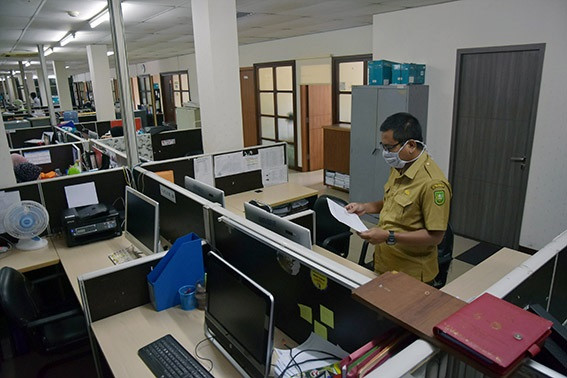Popular Reads
Top Results
Can't find what you're looking for?
View all search resultsPopular Reads
Top Results
Can't find what you're looking for?
View all search resultsRemote work? Not now
For a civil service often criticized for its slow pace and a traditional emphasis on physical presence, transitioning to a less supervised environment could exacerbate existing inefficiencies.
Change text size
Gift Premium Articles
to Anyone
T
he government, through a regulation signed by the administrative and bureaucratic reforms minister, now allows civil servants to work from anywhere for up to two days a week, albeit with rigid conditions that many, if not most, of them will find difficult to meet.
The initiative aligns with the fast-changing world, including in the bureaucratic landscape, which is driven by advancements in information technology. Countries across the globe have also been shifting toward remote working for those responsible for the delivery of public services. Estonia is a pioneer in digital governance and has heavily invested in e-government services, and our close neighbor, Singapore, is now doing the same.
With a vision of developing a world-class bureaucracy, Indonesia must explore this model for its civil service apparatus. In fact, we adopted remote work, by force, when the COVID-19 pandemic struck and required social distancing to contain the spread of the disease. Of course, the pandemic is not an ideal impetus for a flexible work scenario for our civil servants.
There has been no review about whether hybrid work is effective based on the pandemic experience. However, the fact that we returned to the old work-from-office system proved that our bureaucracy is not yet ready for a work-from-anywhere setting.
A deeper examination reveals that beneath the surface of technological readiness, fundamental cultural and systemic issues pertaining to low productivity, a "please the boss" mentality and a persistent resistance to good governance principles pose significant obstacles to the successful implementation of widespread remote working within our bureaucracy.
First of all, the prevalent issue of low productivity within the civil service forms a critical barrier. Remote work models thrive on individual discipline, outcome-based assessment and a strong sense of personal accountability.
For a civil service often criticized for its slow pace and a traditional emphasis on physical presence over tangible output, transitioning to a less supervised environment could exacerbate existing inefficiencies rather than mitigate them. How can we expect civil servants, who are keen to browse social media platforms even during office hours, to boost productivity outside of their office?
It comes as no surprise that public policy observers have expressed concern that the flexible work arrangement for civil servants could worsen public service delivery, despite assurances from the government that the new system will not compromise public service.
Second, the entrenched "please the boss" mentality directly contradicts the core tenets of effective remote work. This hierarchical culture, where demonstrating loyalty and obedience often outweighs independent initiative and performance, is fundamentally incompatible with the trust-based relationship essential for remote teams.
In a remote setting, supervisors must empower employees with autonomy, relying on their professional integrity and commitment to results. If performance is still primarily assessed through "face time" or perceived deference rather than measurable achievements, remote work will even foster an environment ripe for disengagement, as civil servants focus on optics rather than actual work in the absence of direct supervision.
Third, and perhaps most critically, resistance to principles of clean government and good governance remains in our bureaucracy despite decades-long reforms. Where corruption, inefficiency and a lack of public service orientation are already concerns, shifting to a remote model without addressing these mentality issues beforehand will only do more harm than good.
Beyond those human resource matters, work from anywhere is unlikely to work in remote regions, as the new mechanism requires a reliable internet connection. And even if the internet penetrates all corners of this vast archipelago, cybersecurity remains a tough challenge. A series of ransomware attacks in the last few years has exposed Indonesia’s vulnerable cyber defense, which is why digital governance is a risky undertaking.
While the allure of remote work for the civil service is inevitable, its effective implementation hinges on addressing entrenched systemic and cultural impediments. Perhaps, until Indonesia completes its bureaucratic reforms, we cannot let civil servants fully move to hybrid work.











